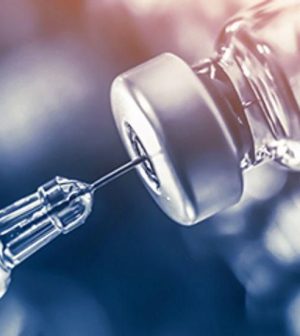- 10 Strategies to Overcome Insomnia
- Could Artificial Sweeteners Be Aging the Brain Faster?
- Techniques for Soothing Your Nervous System
- Does the Water in Your House Smell Funny? Here’s Why
- Can a Daily Dose of Apple Cider Vinegar Actually Aid Weight Loss?
- 6 Health Beverages That Can Actually Spike Your Blood Sugar
- Treatment Options for Social Anxiety Disorder
- Understanding the Connection Between Anxiety and Depression
- How Daily Prunes Can Influence Cholesterol and Inflammation
- When to Take B12 for Better Absorption and Energy
Vaccination Key to ‘Super Immunity’ Against COVID-19

Coronavirus infections before or after vaccination provide equal levels of increased immunity, and the key to this so-called “super immunity” is to be vaccinated, researchers report.
“It makes no difference whether you get infected-and-then-vaccinated, or if you get vaccinated-and-then-a-breakthrough infection,” said study co-senior author Fikadu Tafesse. He is an assistant professor of molecular microbiology and immunology at the Oregon Health & Science University (OHSU) School of Medicine, in Portland.
“In either case, you will get a really, really robust immune response — amazingly high,” Tafesse said in a university news release.
The study included 104 university staff who received the Pfizer vaccine. Of those, 42 had never been infected, 31 were infected before vaccination, and 31 were infected after vaccination (breakthrough infections).
Blood samples from the participants were exposed to three variants of the SARS-CoV-2 virus, and the results showed that both groups who had been infected had much stronger immunity against the viruses than those who hadn’t been infected.
Specifically, the blood of those who’d been vaccinated and infected (hybrid immunity) had equally more abundant and more effective antibodies — at least 1,000% more effective — than the blood of those who’d been vaccinated but never infected.
The study was conducted before the emergence of the highly transmissible Omicron variant, but the authors believe the hybrid immune response would be similar with that variant.
“The likelihood of getting breakthrough infections is high because there is so much virus around us right now,” Tafesse explained. “But we position ourselves better by getting vaccinated. And if the virus comes, we’ll get a milder case and end up with this super immunity.”
The findings were published online Jan. 25 in the journal Science Immunology.
“I would expect at this point many vaccinated people are going to wind up with breakthrough infections — and hence a form of hybrid immunity,” said study senior co-author Dr. Bill Messer, an assistant professor of molecular microbiology and immunology and medicine (infectious diseases) at OHSU.
As Omicron continues to rage, many unvaccinated people who were previously infected are likely to be infected again, and will have a much more variable degree of immune response than those who are vaccinated, according to Messer.
“I can guarantee that such immunity will be variable, with some people getting equivalent immunity to vaccination, but most will not,” he added. “And there is no way, short of laboratory testing, to know who gets what immunity. Vaccination makes it much more likely to be assured of a good immune response.”
Another member of the research team agreed.
“Immunity from natural infection alone is variable. Some people produce a strong response and others do not,” said study senior co-author Dr. Marcel Curlin, an associate professor of medicine (infectious diseases) at OHSU and director of OHSU Occupational Health. “But vaccination combined with immunity from infection almost always provides very strong responses.”
More information
For more on COVID-19 vaccines, go to the U.S. Centers for Disease Control and Prevention.
SOURCE: Oregon Health & Science University, news release, Jan. 25, 2022
Source: HealthDay
Copyright © 2026 HealthDay. All rights reserved.










